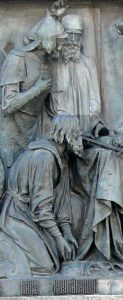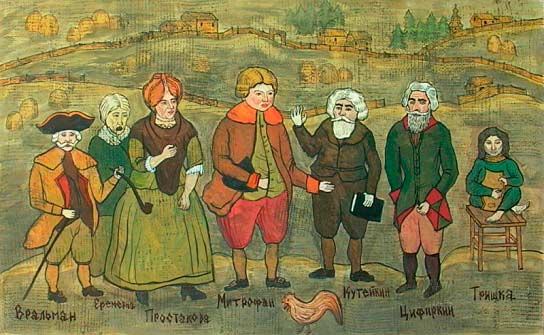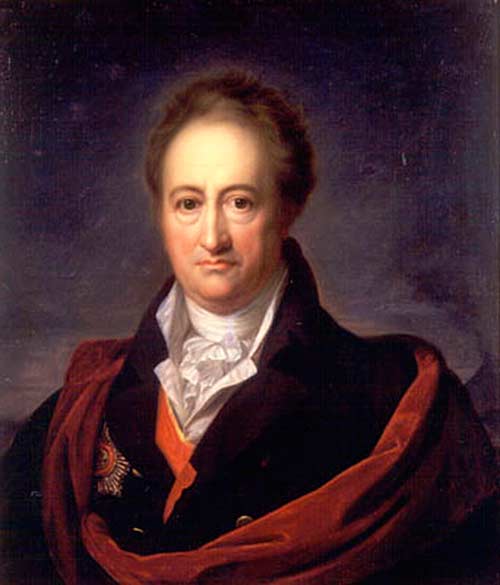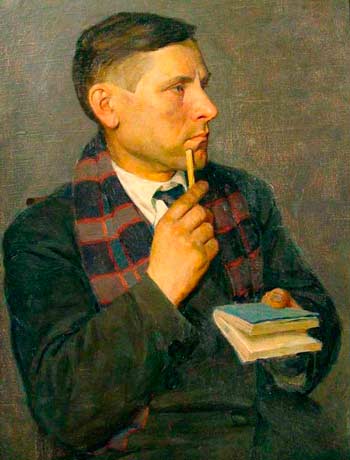conversations sound
“The Tale” by Abraham Palitsyna
 The famous figure of the Time of Troubles, Avraham Palitsyn, described the circumstances of protection from the Polish troops of the Trinity-Sergius Lavra and his personal exploits in a work entitled: “The Legend of the Troitsky Sergiyev Monastery siege from the Poles and Lithuania, and the insurgencies later in Russia, composed by the Holy Trinity Monastery Kelarem Abraham Palitsyn. This “Legend” is a monument, remarkable as much in literary as in historical terms and reveals in the author remarkable literary talent and not only the reading in books of theological content, but also familiarity with the facts of the history of civil and even philosophy. Continue reading
The famous figure of the Time of Troubles, Avraham Palitsyn, described the circumstances of protection from the Polish troops of the Trinity-Sergius Lavra and his personal exploits in a work entitled: “The Legend of the Troitsky Sergiyev Monastery siege from the Poles and Lithuania, and the insurgencies later in Russia, composed by the Holy Trinity Monastery Kelarem Abraham Palitsyn. This “Legend” is a monument, remarkable as much in literary as in historical terms and reveals in the author remarkable literary talent and not only the reading in books of theological content, but also familiarity with the facts of the history of civil and even philosophy. Continue reading
“Woe from Wit” and “Misanthrope” by Moliere
 Of foreign works, the comedy by Moliere “Misanthrope” was especially important for “Woe from Wit” (see the summary, analysis and the full text). Studies by Professor Alexei Veselovsky showed that the image of Alceste was reflected in Chatsky: in the work of Griboyedov, the love story of the main character of “The Misanthrope”, Alceste, was repeated. Finally, the similarities are observed in some trifles. Of course, such a borrowing doesn’t make Griboedov’s comedy non-independent: if the form and some details were borrowed, then its content remained deeply Russian. Continue reading
Of foreign works, the comedy by Moliere “Misanthrope” was especially important for “Woe from Wit” (see the summary, analysis and the full text). Studies by Professor Alexei Veselovsky showed that the image of Alceste was reflected in Chatsky: in the work of Griboyedov, the love story of the main character of “The Misanthrope”, Alceste, was repeated. Finally, the similarities are observed in some trifles. Of course, such a borrowing doesn’t make Griboedov’s comedy non-independent: if the form and some details were borrowed, then its content remained deeply Russian. Continue reading
“Woe from Wit” – analysis, briefly
 “Woe from Wit” is the main work of Griboyedov’s entire life and is one of the best works of Russian dramatic literature. Despite the fact that Griboyedov describes Russian society in a very specific historical era (the first half of the 19th century), the comedy has not lost it and will never lose its freshness, will not become outdated, will enjoy the same success. In this we see undoubted proof of her genius of the work.
“Woe from Wit” is the main work of Griboyedov’s entire life and is one of the best works of Russian dramatic literature. Despite the fact that Griboyedov describes Russian society in a very specific historical era (the first half of the 19th century), the comedy has not lost it and will never lose its freshness, will not become outdated, will enjoy the same success. In this we see undoubted proof of her genius of the work.
“Woe from wits” – and the picture of morals, and the gallery of living types, and the ever-acute burning satire on “Famusov society”, and at the same time, comedy, most of all – comedy, which can hardly be found in other literatures, ”writes another major Russian writer, Goncharov, in his remarkable article “A Million Torments”. Continue reading



